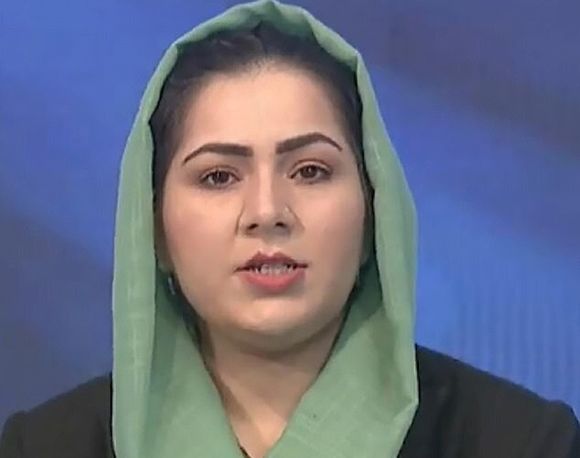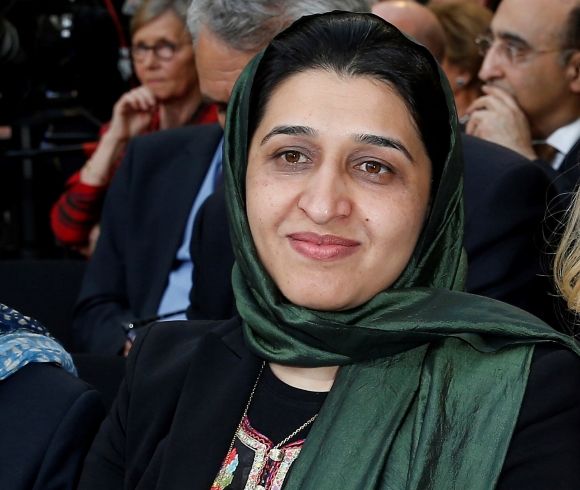It has been just weeks since the Taliban took Kabul. One of the city’s women speaks for many others when she tells me: “our lives [have been] turned inside out and upside down.”
When the Taliban took control in 1996, most women and girls had to stay at home. That changed in 2001, and since then Afghan women have become frontline politicians, filmmakers, artists, journalists and sports personalities. But despite the recent promise from the Taliban that women would be able to participate actively in society, many have now lost their jobs. Lots of them have left the country; many more living across Afghanistan, who have gained skills as teachers, lecturers or ordinary office workers, are waiting nervously to see what their future holds. Under an all-male cabinet, there are few women present in public institutions aside from doctors and medics.
Three eminent Afghan women tell me what it is like to leave everything behind. Sahraa Karimi was the first female director of Afghan Film, a government body in charge of cinema and theatre. Just before the Taliban entered, she was filming around the city, then went for a pedicure and manicure. Sahraa says “life was normal and good on that day.” She was looking forward to a festival she had arranged. “We had fears about how the Taliban were making advances, but never imagined they would come to Kabul. We were naive.” A day later she had to run for her life. “When I decided to leave Kabul, that was the worst feeling ever. It was painful—it still pains me,” she says. “I was forced to leave… I wish that feeling on no one; no human being should go through it.” Sahraa was evacuated with the help of the Ukrainian government and is currently in France, figuring out what to do next.

With many progressives having fled, and the big cities emptying, she fears that Afghan women are losing their voice. Many young women are still living in Kabul, but the atmosphere is dark. They came onto the streets to protest, but the Taliban shut them down. If there is any hope, Sahraa says, “I want to go back to Kabul. It is my dream to go back. My life is there, my home is there… I cannot just close my eyes and forget about it.”
On the day Sahraa fled, Khadija Amin, a presenter on Afghanistan National Television, went to her job, in the hope the Taliban would let her work. Khadija, who has three children, was stopped at the studio gates and told to go home, even as she watched her male colleagues enter. She says: “My profession was risky already, in the male-dominated society with religious extremists very active.” But she was permitted to do her job. Then suddenly: “On that day I found myself too weak to live in the society under the Taliban—they didn’t let me work, so what should I have done? It was very clear that a democratic woman like me will not be tolerated, but staying at home with an unknown future was not an option for me. That day I walked out and met some female colleagues too, who were also not allowed in. So that was it. I left my country with tears and pain. I was helped by a Spanish journalist to be evacuated, and have decided to start a new life and make a better career in Spain.”
Khadija sees on the news how the Taliban have beaten, tortured and arrested male reporters. “I’m sure there was no female reporter, otherwise they could do the same to them.” Yet “for me this situation is worse than them killing me. Whenever a system takes the freedom… it is killing off the major part of society. I am just sad that all our women who had lots of hope lost everything. I feel without hope living is impossible, so I still hope: one day I will go back and continue my job as a reporter and presenter again.”

Hasina Safi, the minister for women’s affairs, also fled Kabul. The Taliban has replaced her department with a “Ministry of Vice and Virtue,” a reminder of the darkest days of the 1990s. Her ministry had employed women across the country; most are the main breadwinners for their families. Hasina says: “The day I left was the most horrific day of my life. I had to decide to be safe and live with my family. I was becoming a refugee again and knew what it meant. I left home in the evening, it was a terrible situation by the Abbey Gate [entrance to Kabul airport]—it was so crowded, there was gunfire, family members got beaten—so I could see it wasn’t safe. My friend said to me, best to [enter] via the ditch at the back, and I managed to.” Looking ahead, “the situation is very uncertain and there are no guarantees. We need reassurance of our security… Many of us want to go back and continue our life.” Hasina is thankful that her friends in Afghanistan and elsewhere showed “humanity, solidarity and sisterhood.”
For Hasina, the absence of women in the new government is itself one “serious worry.” Afghan women want to live as free, equal citizens, and she knows firsthand how many have collectively struggled for that end. She says: “We will keep up with our struggle and demand our rights, no matter where we are… It is our country, and we can’t let our progress of 20 years go to waste. It is not 1996, it is 2021.”













